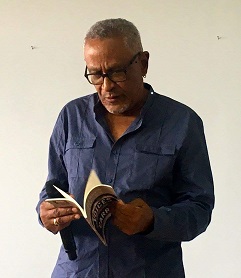
Interview at the Sangre Grande Public Library for World Poetry Day: https://fb.watch/4kynjfO8G
Interview & reading with Susana H. Case on Bar Crawl Radio: https://shows.acast.com/bar-crawl-radio/episodes/mentoring-poets-susana-h-case-mervyn-taylor
Mervyn Taylor is a Trinidad-born poet who divides his time between Brooklyn, NY, and his native island. A St. Mary’s old boy, he is a graduate of Howard and Columbia Universities, where he had the opportunity of being under the tutelage of such luminaries as the great folk poet Sterling Brown, and Nobel laureates Derek Walcott and Joseph Brodsky.
Taylor went on to teach at many institutions, including Bronx Community College, The Young Adult Learning Academy, The New School University, and in the NYC public school system, being nominated best teacher several times over. Now retired, he devotes most of his time to his writing, having published six collections of poetry to date. They are: An Island of His Own, The Goat, Gone Away, No Back Door, which won the Paterson Poetry Prize for sustained literary achievement, The Waving Gallery, andVoices Carry. Once a member of the infamous Bud Jones Poets, he has read widely to diverse audiences, and was responsible, together with his friend and colleague the journalist Dawad Philip, for the long-running “Flash & Thunder” reading series at Brooklyn’s Restoration Center, and together with Esther Louise and Paul Gibson, the series ‘Soirees”, in Fort Greene.
More recently, in Trinidad, he has conducted workshops for incarcerated youth as part of a program run by columnist Debbie Jacob, a champion in helping young men successfully reach academic goals. Last year, he was invited as a guest of the American consulate in Haiti to conduct a series of English language arts workshops at various locations in Haiti, including the University of The Caribbean at Les Cayes, with radio interviews and readings.
In his poems, for which he received two New York State Council on the Arts grants, Taylor returns consistently to themes that deal with ordinary folk, with family and friends, finding the heroic quality of their lives as they face the difficulties of survival. He speaks of a cousin, now blind, who looks after his mother, also blind, taping on the clothes she insists on tearing off. He plays music as she complains, “there’s no one to dance with!” He writes about the terrible earthquake in Haiti, about the resilient people whom, “freedom eludes, like a goat that has run into the sea.” He recalls his father, in the old days a Trinidad Railway conductor, who “lost his thumb to the trains.”
Last year, it was his pleasure, along with Adrian Augier, to introduce Derek Walcott, the Nobel Prize winning St. Lucian poet, at a ceremony at Medgar Evers College, where Walcott received the W. E. B. Du Bois award for his body of work. Taylor emphasized the significance of the fact that such an event was being held in the borough of Brooklyn, a place where the largest population of Caribbean people live, outside of the Caribbean. Walcott spoke of the “quiet quality of Taylor’s work, the subtlety of his voice.”
Besides writing, Taylor busies himself with his four grandkids and his other passions—art, and costume design. An avid masquerader, he has long been part of the Carnival culture both in Brooklyn and in Trinidad, producing with colleague Roy Pierre some of the winningest bands, including the memorable Midnight at The Oasis, and Cotton & Cane, whose theme was slavery in the American South and in the cane fields of the West Indies. Also, out of found items, cardboard, metal, wool, whatever comes to hand, he creates art, in his apartment situated at the vantage point he calls, “the center of the world,” in the poem by the same name. It begins, “From here, I can see all the people going down Flatbush Avenue…all the immigrants in winter wearing too much clothes…” (No Back Door).
A new collection came out in 2023: The Last Train, from Broadstone Books.